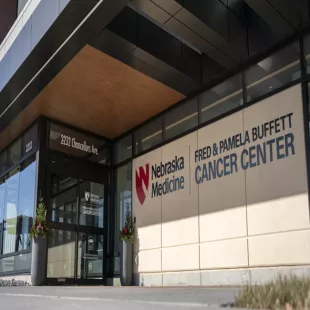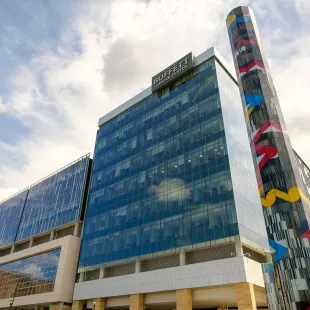Bladder cancer affects men about three times more often than women. Your risk also increases with age—over 90 percent of people who are diagnosed with it are older than 55. One of the first signs of bladder cancer is often blood in the urine that may come and go. It can also cause pain and burning during urination, frequent urination or trouble urinating. While many of these symptoms are common signs of other conditions, don’t wait to get it checked out.
If you are diagnosed with bladder cancer, Nebraska Medicine's urological cancer specialists will provide the most current and advanced treatments customized to your needs to provide you the best results. Bladder cancers found in the earliest stages have an excellent outcome.
Why Come to Nebraska Medicine
We Have the Expertise
We have a team of cancer doctors who specialize in bladder cancer and offer a variety of treatment options to provide you the best optimal outcome. Using doctors who subspecialize in a specific area of cancer typically results in better outcomes due to greater knowledge and experience in treating your type of cancer.
Most Advanced Treatment Options
The experts at Nebraska Medicine offer the latest medical and surgical treatment options to give you the best fighting chance including some of the latest types of targeted, gene and immunotherapies. These treatment options include:
Robotic Cystectomy
Bladder cancer may involve removal of the bladder (cystectomy) and reconstruction, an intricate and complex procedure that requires the expertise of experienced doctors. Whenever possible, our experienced urologic surgeons perform the cystectomy procedure using robotics. Robotic cystectomy is a minimally invasive surgical procedure for bladder cancer that requires smaller incisions, sparring vital, but sensitive nerve and muscle tissue, a shorter hospital stay, fewer complications and a faster recovery time. This procedure also includes urinary diversion for reconstruction of the removed bladder. Our surgeons offer several urinary diversion procedures that can be performed based on your needs:
- Neobladder reconstruction
- Ileal conduit urinary diversion
- Indiana pouch
Intravesical Immunotherapy
Use to treat early-stage bladder cancer, this type of therapy uses an immunotherapy that is inserted into the bladder and kills the active bladder cancer cells.
Immune Checkpoint Inhibitors
These are monoclonal antibody drugs that target checkpoints, which are molecules on immune cells that need to be activated to start an immune response. The monoclonal antibodies can be used to target certain checkpoint proteins to boost immune response against cancer cells.
Targeted therapy
These are drugs that are used to effect the activities that control growth, division, the spread and death of cancer cells.
Anti-angiogenesis drugs
These drugs target the blood vessels that allow tumors to grow and stop the tumors from making new blood vessels.
Gene therapy
These drugs are used to target the gene changes that help cancer cells grow.
We're in This With You
We’re revolutionizing cancer care, using your own genetic identity to create the most targeted care plan, and offering more lifesaving clinical trials and technology.
As part of our ongoing effort to provide you with the latest cancer treatments close to home, in June 2017 we opened the Fred & Pamela Buffett Cancer Center at Nebraska Medicine — one of the foremost research and treatment centers in the nation.
Regardless of which of our four locations you’re being seen at, extraordinary care is just a short drive from home. All patients undergoing cancer treatment with Nebraska Medicine have access to our Infusion Center at the Fred & Pamela Buffett Cancer Center, which serves as a treatment center and urgent-care-type facility for those battling cancer.
Clinical Trials
Many of our specialists are very involved in research to find new treatments and cures for bladder cancer. This affords our doctors the opportunity to take part in some of the most current clinical trials, giving you early access to the newest drugs and most cutting-edge treatment options before they become widely available.
Addressing Your Personal Care Needs
Addressing a patient’s physical, educational, emotional and spiritual needs are important aspects of providing a more complete and holistic approach to care. A host of amenities and supportive services are available to help meet these needs. This includes personal care services such as wigs, wig fittings, stoma care education, yoga, massage therapy, skin care and make-up lessons specifically geared for people with or recovering from cancer are also provided in a private setting.
Cancer Support Services
Finding out that you have cancer can be a very emotional and difficult time. You will likely have many questions and issues to work through. We will be with you every step of the way. Nebraska Medicine offers a host of cancer support services to help you with your physical, emotional, educational and financial needs.
We're Here for You Long After Your Treatment
Our Survivorship Clinic is designed to help you deal with the emotional and physical challenges cancer can leave behind such as fear of recurrence, physical and medical long-term side effects and helping you return to a normal life again. It will also help you transition back into the care of your primary care physician.
Our Locations
-

-

Fred & Pamela Buffett Cancer Center - Nebraska Medical Center
505 S 45th St.
Get Directions
Omaha NE 68105
Blue Cross Blue Shield of Nebraska Blue Distinction Center+
Blue Distinction Centers and Blue Distinction Centers+ have a proven history of delivering exceptional care and results. Nebraska Medicine has received Blue Distinction in bladder cancer.